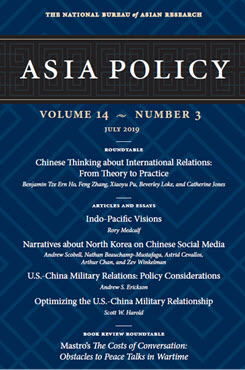One Mountain, Two Tigers
China, the United States, and the Status Dilemma in the Indo-Pacific
This essay proposes that the concept of a status dilemma is a valuable framework to analyze Sino-U.S. tensions and draws implications for China’s regional role and Sino-U.S. relations.
Executive Summary
MAIN ARGUMENT
Sino-U.S. tensions are often analyzed in terms of a security dilemma. However, they might be better interpreted as exhibiting a status dilemma. The U.S. and China each worries that the other seeks regional domination. While it is clear that China wants to play a leadership role in the regional economic order, its attitudes concerning the regional security order are more ambiguous. This uncertainty over status is contributing to rising tensions in the relationship. In particular, several factors have complicated the signaling and recognition of status that occurs between the U.S. and China. Chinese leaders sometimes exaggerate China’s power and status for domestic political purposes, and these status signals might provoke international backlash. The U.S., for its part, is often sensitive to any potential challenge to its status as a hegemon.
POLICY IMPLICATIONS
- The U.S. must demonstrate the resolve that it intends to remain a key player in the Indo-Pacific for the foreseeable future. As China’s influence and status grow in Asia, the U.S. must increasingly send signals to its allies and partners that display its credible commitments in the region.
- As strategic competition between the U.S. and China becomes more intense, both countries must realize their long-term interest in eschewing a new Cold War. A key factor is to avoid framing the competition as an ideological struggle.
- Competition does not mean that the U.S.-China relationship is necessarily always a zero-sum game. The U.S. must compete with China in various domains, but cooperation is also necessary to deal with common challenges both regionally and globally.
- Domestic reform and economic growth will shape each country’s long-term trajectory. Even if competition intensifies, self-strengthening reforms—rather than open confrontation—offer a way forward for U.S.-China relations in the future.
Xiaoyu Pu is an Associate Professor of Political Science and Director of Graduate Studies at the University of Nevada, Reno. He is also a Public Intellectuals Program Fellow with the National Committee on United States–China Relations and a Nonresident Senior Fellow at the Inter-American Dialogue in Washington, D.C. He is the author of the book Rebranding China: Contested Status Signaling in the Changing Global Order (2019).
About Asia Policy
Asia Policy is a peer-reviewed scholarly journal presenting policy-relevant academic research on the Asia-Pacific that draws clear and concise conclusions useful to today’s policymakers. Asia Policy is published quarterly in January, April, July, and October and accepts submissions on a rolling basis. Learn more


